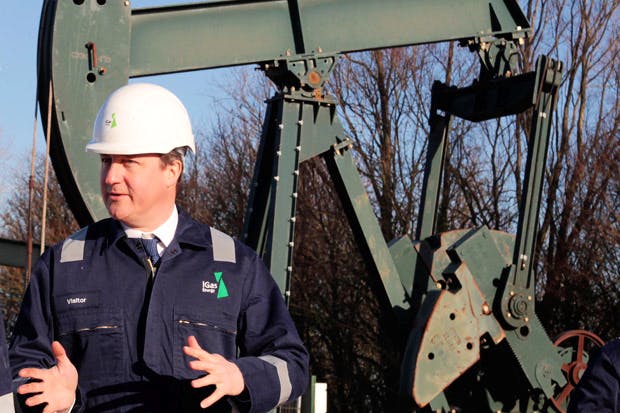Over the past week, the government has finally made a decisive move to kickstart a fracking industry in Britain. Licences have been issued for shale gas exploration and the planning process streamlined so that in future, if local councils fail to make decisions within 16 weeks, the communities secretary will step in and adjudicate.
It’s excellent news that the years of prevarication over shale seem finally to have come to a close, and greatly to the credit of our Climate Change Secretary, Amber Rudd, and Communities Secretary, Greg Clark. But the dismally slow speed at which our much-vaunted ‘shale revolution’ has taken place will end up costing this country.
The coalition liked to talk up fracking, but the truth is that they failed to make the legislative changes which were necessary to allow it to happen. In one sense, the coalition actually made things worse: by abolishing the Infrastructure Planning Commission that Labour had set up to make decisions about projects of national importance.
The folly of failing to give fracking full-hearted support became clear last month when councillors in Lancashire rejected two planning applications for fracking sites, both on the parochial grounds that they would increase lorry traffic and lead to urbanisation of a rural or semi-rural area. The Lancashire decisions were cheered by residents, and anti-fracking groups proclaimed a ‘victory for localism’. So it was. It was also a perfect example of how the creed of localism can be deeply misguided. It’s all very well to allow residents a say on the design of new housing or the size of extensions, but there’s no sense in allowing them to veto matters of national importance. To make a responsible decision about whether to sink a fracking well means balancing the economic benefit with the disruption to the local environment.
Judged on a national scale, there is a very strong case for enabling fracking. If the industry here follows the lead given by the US, it will lead to sharply reduced energy bills for homes and businesses as well as a dramatic cut in carbon emissions as coal power is replaced by gas, which, kilowatt-hour for kilowatt-hour, emits half as much carbon. The potential damage done by fracking is, on the other hand, mostly minor: a rise in lorry traffic and the erection of unsightly drilling rigs. The hazards constantly invoked by the anti-fracking lobby — of earthquake and contaminated water — are extremely low risks.
Yet it is too much to expect residents facing the prospect of fracking in their neighbourhood to see things objectively. For them, the benefits will not necessarily outweigh the costs. Leaving local communities to rule on fracking therefore means a complete block on the industry, which nationally is in the interests of only a few.
It is to be hoped that with the Lib Dems gone, this decisive move on fracking will be followed by a more rational energy policy overall. As things stand, Britain remains committed to unilateral carbon reduction targets, which were arrived at without any thought for the cost to the economy. In the end, these cuts to carbon emissions achieve nothing but to shift emissions from British industries to ones based abroad. Faced with the prospect of losing much of our manufacturing industry to Asia, where energy taxes are lower, George Osborne has allowed some compensation to energy-intensive industry but the government has failed to tackle the underlying problem: the Climate Change Act.
If Amber Rudd is minded to address this issue, as well as the fracking problem, she should go on to become one of this government’s high-achievers. It is right that the government should have a clean energy policy. But it will ultimately achieve nothing if it isn’t also an affordable energy policy.
Got something to add? Join the discussion and comment below.
Get 10 issues for just $10
Subscribe to The Spectator Australia today for the next 10 magazine issues, plus full online access, for just $10.














Comments
Don't miss out
Join the conversation with other Spectator Australia readers. Subscribe to leave a comment.
SUBSCRIBEAlready a subscriber? Log in